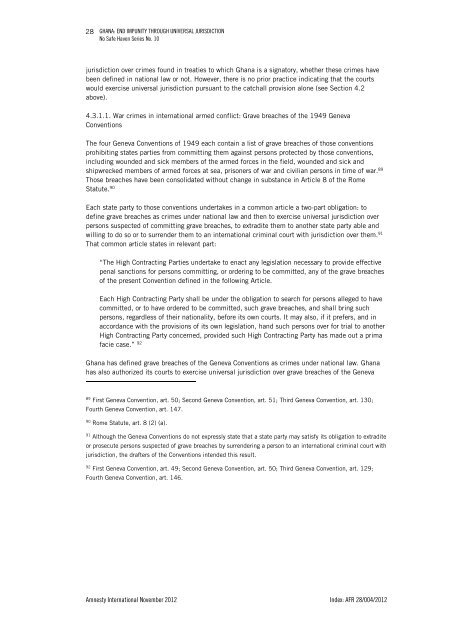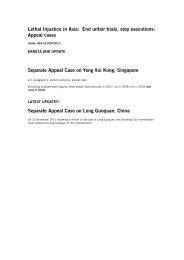Ghana - Amnesty International
Ghana - Amnesty International
Ghana - Amnesty International
You also want an ePaper? Increase the reach of your titles
YUMPU automatically turns print PDFs into web optimized ePapers that Google loves.
28GHANA: END IMPUNITY THROUGH UNIVERSAL JURISDICTIONNo Safe Haven Series No. 10jurisdiction over crimes found in treaties to which <strong>Ghana</strong> is a signatory, whether these crimes havebeen defined in national law or not. However, there is no prior practice indicating that the courtswould exercise universal jurisdiction pursuant to the catchall provision alone (see Section 4.2above).4.3.1.1. War crimes in international armed conflict: Grave breaches of the 1949 GenevaConventionsThe four Geneva Conventions of 1949 each contain a list of grave breaches of those conventionsprohibiting states parties from committing them against persons protected by those conventions,including wounded and sick members of the armed forces in the field, wounded and sick andshipwrecked members of armed forces at sea, prisoners of war and civilian persons in time of war. 89Those breaches have been consolidated without change in substance in Article 8 of the RomeStatute. 90Each state party to those conventions undertakes in a common article a two-part obligation: todefine grave breaches as crimes under national law and then to exercise universal jurisdiction overpersons suspected of committing grave breaches, to extradite them to another state party able andwilling to do so or to surrender them to an international criminal court with jurisdiction over them. 91That common article states in relevant part:“The High Contracting Parties undertake to enact any legislation necessary to provide effectivepenal sanctions for persons committing, or ordering to be committed, any of the grave breachesof the present Convention defined in the following Article.Each High Contracting Party shall be under the obligation to search for persons alleged to havecommitted, or to have ordered to be committed, such grave breaches, and shall bring suchpersons, regardless of their nationality, before its own courts. It may also, if it prefers, and inaccordance with the provisions of its own legislation, hand such persons over for trial to anotherHigh Contracting Party concerned, provided such High Contracting Party has made out a primafacie case.” 92<strong>Ghana</strong> has defined grave breaches of the Geneva Conventions as crimes under national law. <strong>Ghana</strong>has also authorized its courts to exercise universal jurisdiction over grave breaches of the Geneva89First Geneva Convention, art. 50; Second Geneva Convention, art. 51; Third Geneva Convention, art. 130;Fourth Geneva Convention, art. 147.90Rome Statute, art. 8 (2) (a).91Although the Geneva Conventions do not expressly state that a state party may satisfy its obligation to extraditeor prosecute persons suspected of grave breaches by surrendering a person to an international criminal court withjurisdiction, the drafters of the Conventions intended this result.92First Geneva Convention, art. 49; Second Geneva Convention, art. 50; Third Geneva Convention, art. 129;Fourth Geneva Convention, art. 146.<strong>Amnesty</strong> <strong>International</strong> November 2012 Index: AFR 28/004/2012
















